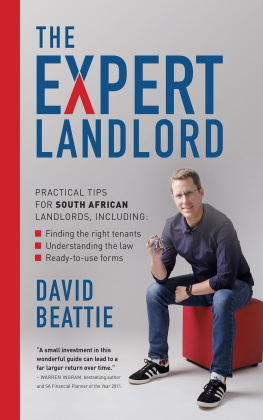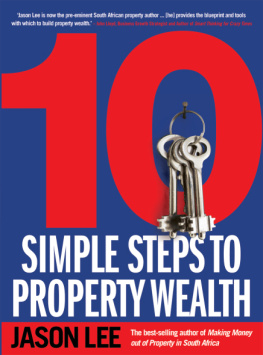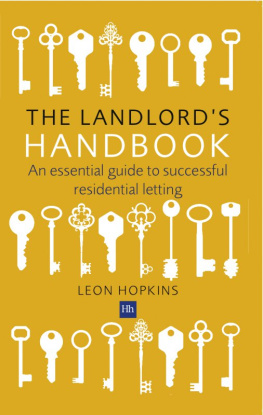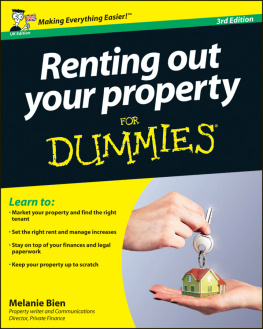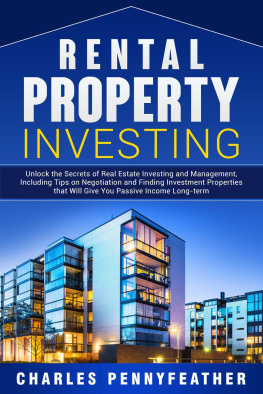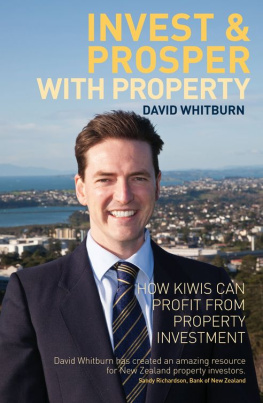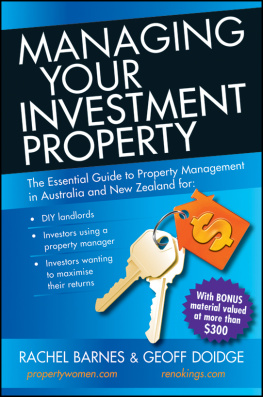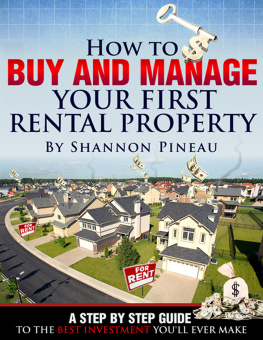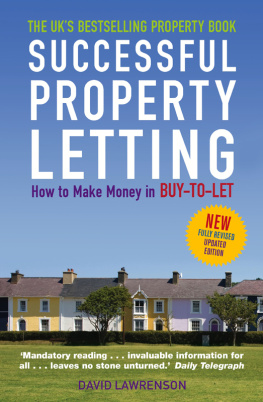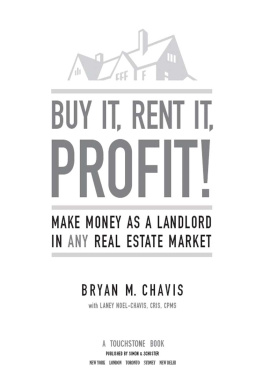If you want to improve your residential property letting skills, I can think of no one better to learn from than David.
Simply stated and accurate, with practical advice on how to handle important legal aspects to ensure that a property owner realises an ongoing investment.
Foreword
My journey as a property investor, founder-publisher of Real Estate Investor Magazine , entrepreneur and mentor has put me on an incredible personal growth path. It has been filled with the tremendous highs and lows of successes and failures. I have always said that the best way to learn is to make mistakes and, more importantly, to learn from them.
I believe that David Beatties book provides both the novice and experienced property investor with a road map to success in a business with many pitfalls. Property investment, regardless of your personal level of experience, requires a commitment and skill that can only be acquired by sticking to certain fundamentals: thorough research, experience, hard work, astute judgement, a willing financier, a great team and most importantly the ability to control both the property management process and the money side, which includes effective rent collection. Get that last part slightly wrong and your chances of obtaining those sought-after and regularly promoted returns can be severely compromised.
Over the years I have learnt three fundamental investment practices, which David explores in this book . First, an investment must always put money in your pocket; one of the key sources in residential property is cash flow through rental income. Second, the investment must stand alone as a profitable entity on its own income. Third, you must have control of your investment from income, expenses and debt through to changing the purpose of the property.
I first got to know David as a co-investor and later as a client of his successful property letting business, Chorus Letting. He chose property management as his route to property success, and oversaw and managed one of my multiple buy-to-let residential properties a few years back. David was more than just an average property manager. He was a key part of my investment team. His communication skills and grasp of administration were outstanding. As an investor, he knew the impact of vacancies on an investors income, or if a property had been trashed. He knew which steps to take if an eviction had to take place, and would ensure that I was up to date on the status of my investment. Not only did I see a passionate property investor, but I also saw someone who was committed to making a difference in the area of property management and ensuring that I was a satisfied client. Above all, David believes as I do that real estate investing is a people business.
If you have not been a property investor, it is easy to make mistakes and waste a lot of time, effort and hard-earned money. This book provides aspiring investors with essential information on how to become a successful property investor through effective property management.
I recommend this book to anyone playing the residential property investment game. It really is worth the educational investment.
I wish you successful investing.
NEALE PETERSEN
Founder-publisher of Real Estate Investor Magazine
Introduction
Set Yourself Up for Success
How to use this book
The Expert Landlord is a resource written in plain language, with practical, easy-to-implement tips and advice. Youll find this book packed with:
- Practical tips you can immediately use
- Step-by-step procedures and processes that make sense and are easy to follow
- Expert tips to highlight special points of interest.
The book takes a South African legislative perspective. Please note that each province may have slightly different approaches to certain legal issues. Youll find references to online links to the latest legislation.
An easy reference guide
The Expert Landlord covers the entire residential property management process. Simply go to the section of the book that deals with the problem you are experiencing. Section 1 introduces the basic principles and a practical approach to professional property management, and also covers the legislation that guides landlord and tenant responsibilities. Section 2 looks at selecting and placing the right tenant, including preparing and marketing your property and screening prospective tenants. Section 3 walks you through the daily, weekly and monthly actions required to ensure professional property management. Consistency is one of the keys to a successful property investment, and this section will equip you to achieve consistency in each critical property management process.
Throughout the book, youll find links to online resources and tools available at the Expert Landlord website (www.theexpertlandlord.com). This is designed to help landlords in their property management journey. The Resources and Tools section at the end of the book provides a full description of the features available on the site. Another handy resource is PocketLet (www.pocketlet.com), a mobile app designed to give you the property management tools you need when you need them. The Resources and Tools section tells you more about PocketLet.
What this book doesnt cover
The property field is extremely broad. There are so many different areas to it. Unfortunately, this book cant, and doesnt pretend to, cover everything in property. Because the management of residential property is so critical to success in property management, I have concentrated on this area. Thus, this book focuses purely on tenant placement and rental management for residential property.
This book doesnt provide general property investment advice, for example how to analyse whether a property investment is a good choice or not, where to buy and what type of property to buy. Nor does it cover commercial property investment, brokerage and property management. Fortunately, there are many resources to assist you in these areas.
Section
THE EXPERT LANDLORD BASICS
Chapter 1
You Are a Landlord
What you will learn in this chapter
- Choosing which type of landlord you want to be
- What it means to be a landlord
- How to give thought to your why.
A landlord is someone who owns a property and rents it to an individual or business (called a tenant or lessee). Also referred to as a lessor, a landlord is responsible for the performance of a property.
The lease agreement is a contract outlining the terms of the rental, such as the price paid for the monthly rent, the penalties for late payment, the length of the lease and the responsibilities of landlord and tenant.
A tale of two landlords
This is a story about two landlords I know, Thabo and Sunette, and their experience with property management.
The unenthusiastic landlord
Thabo has two rental properties. One is a two-bedroom apartment in Randburg that he inherited when his father passed away three years ago. The second property is a cottage at the back of his home in Fourways. At first he was happy to receive extra income each month, but didnt have much of a plan for his properties, and simply got on with the rest of his busy life.
A year or so back, a cousin of his asked, as a favour, if he could stay in the cottage for a few months. This morphed into his staying on after the initial period. Thabo was not too fussed; he was receiving rent each month, and besides, he was there to help his family. They didnt put anything in writing they were family, after all. His cousin had moved in over a weekend and Thabo hadnt had the time to walk through the property with him.

